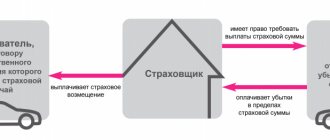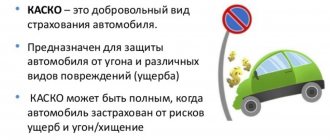Is payment under compulsory motor liability insurance taxable?
To answer this question, we need to be clear about what we mean by the word “payment.” After all, the insurer can pay not only insurance compensation. As of 2021, the following items of money received from an insurance company may be:
- directly the payment received in the form of MTPL insurance compensation for the restoration of the car - looking ahead, we point out that only this is not subject to income tax,
- penalty for refusal or delay in compensation,
- financial sanction in the form of a fine in favor of the plaintiff (victim of the accident),
- compensation for various damages (moral damage, legal costs, etc.).
In accordance with paragraph 1 of Article 213 of the Tax Code of the Russian Federation:
when determining the tax base, income received by the taxpayer in the form of insurance payments is taken into account, with the exception of payments received: under compulsory insurance contracts carried out in the manner established by the legislation of the Russian Federation;
Thus, the insurance payment itself (direct compensation for damage) under compulsory motor liability insurance is not taxed. And even if you receive a letter from the insurance company reminding you of the need to pay, you can safely ignore it in cases where only the payment for the main compensation was made.
And this is quite logical, because in fact this is not the profit of the victim - this is the amount of money that he will spend on repairing his car (or health).
TCB
Loss of market value is included in the insurance compensation, so this part of the payment is also not subject to personal income tax deduction from the driver.
Penalty
In accordance with paragraph 21 of Article 12 of the Law on Compulsory Motor Liability Insurance, the insurer, in case of violation of its obligations, pays the victim a penalty and a financial sanction. In total they cannot exceed 400,000 rubles.
But penalties and financial sanctions are not included in the insurance payment, since they are a measure of the insurer’s liability for failure to fulfill obligations. And since this is not an insurance payment, it means, in accordance with the Tax Code, it is subject to taxation as income.
Fine
In accordance with clause 3 of Article 16.1 of the Law on Compulsory Motor Liability Insurance, if the insurance company does not voluntarily pay the insurance compensation, the court will collect a fine from it in favor of the victim (plaintiff). The fact that this amount will be awarded by the court does not exclude it from the tax base, and the victim will also have to pay tax on it.
Additional expenses associated with an accident
If harm is caused in an accident, not only restoration costs are subject to compensation, but also other expenses, the most common of which are:
- expenses for evacuation of a vehicle from the scene of a traffic accident,
- storing a damaged vehicle in a paid parking lot,
- delivery of the victim to a medical facility and others.
They are caused by the occurrence of an insured event and are part of the insurance compensation, therefore they will not be taxed.
Is insurance payment taxable?
The letter of the law clearly states that for individuals, payment of compensation under compulsory insurance policies is not income.
However, there are a number of nuances associated with many drivers receiving so-called “chain letters” demanding payment of tax. Referring to the Tax Code of the Russian Federation, the insurance company is the tax agent of the policyholder and is required by law to notify him and the tax office in writing that the amount of tax has not been withheld. The insurer, fulfilling the requirement, sends a letter to the driver and the tax office, regardless of what type of insurance we are talking about: whether it is compulsory motor insurance, voluntary CASCO or other types.
Is it necessary to pay personal income tax on insurance payments under compulsory motor liability insurance?
So, referring to legislative acts, we found out that for individuals, insurance payment is not income, therefore, there is no need to pay tax. In what cases will the beneficiary be obliged to comply with the requirements?
Expert opinion
Mironova Anna Sergeevna
Lawyer and lawyer for automobile law. Specializes in administrative and civil law, insurance.
As practice shows, the insurance company most often sends such letters to persons with whom it has sued. The victim, winning the trial, received compensation, fines from the Investigative Committee, penalties and other payments. Such payments no longer apply to compensation under a compulsory insurance policy and, accordingly, are taxed.
Tax on TCB
LTS stands for loss of marketable value of a car. Vehicle compensation is essentially the difference between the value of the car before the accident and after restoration.
Compensations are paid under certain conditions:
- The vehicle must be no older than 3 years for Russian-made brands and no more than 7 years for foreign cars;
- car wear no more than 30%;
- the owner of the vehicle is not the culprit of the accident;
- the car was not in an accident before the current incident;
- the amount of compensation cannot exceed the maximum sum insured.
Compensation for the loss of commercial property is not taxed, according to Article 213 of the Tax Code of the Russian Federation. This payment is a payment under the contract of a mandatory motor third party liability policy.
Penalty tax
According to Federal Law No. 40 “On Compulsory Motor Liability Insurance”, the insurer is responsible for compliance with its obligations. In case of claims against the insurance company, sanctions in the form of a penalty may be applied under the following conditions:
- The insurance company grossly violated the terms of payments and the issuance of directions for car repairs after an accident.
- Violation of the deadline for the return of the insurance premium under the circumstances provided for by the rules of OSAGO.
The penalty is not a payment received on the basis of a compulsory insurance policy. The Ministry of Finance clearly regulates this compensation at the discretion of the court; accordingly, personal income tax will have to be paid in full.
Case studies
To better understand the situation, here are a few examples:
Example 1.
Ivanov is the injured party in a traffic accident. The incident was properly documented, and the victim applied to the Investigative Committee for payment. After considering the case, the insurance company, within the period established by the MTPL rules, paid the driver an amount of 58,000 rubles, of which 50,000 rubles. amounted to compensation for damage to the car and 8,000 rubles. for UTS.
In this case, the car owner does not have to pay personal income tax since both payment items are excluded from the list of income.
Example 2.
Mikhailov contacted the insurance company, but received an insufficient amount to repair the car. Afterwards, an independent examination was carried out and the car owner went to court.
The plaintiff's costs were:
- Expertise – 10 thousand rubles.
- Lawyer services – 15,000 rubles.
The statement of claim contained demands to recover from the insurance company:
- 50 thousand rubles – damage to the car;
- 8 thousand rubles - UTS;
- 20 thousand rubles – penalty for delay;
- 40 thousand rubles – fine for refusal to resolve the problem of a pre-trial claim;
- 15 thousand rubles - legal services;
- 2 thousand rubles - moral damage;
- 10 thousand rubles – cost of examination;
- 800 rub. – postage expenses.
The court decided the case in favor of the plaintiff in full. The following are subject to tax from the amount received:
- penalty;
- fine;
- moral damage.
I received a letter from the insurance company - what should I do?
Here you need to clearly distinguish from whom such a letter came - from the tax office or an insurance company. The fact is that in the vast majority of cases it is the insurer who sends it. And in this case, it has the status of only a notification - a reminder as a gesture of goodwill from the insurance organization.
To pay or not to pay – in any case, it’s up to you to decide.
What happens if you don't pay tax?
According to legislative norms, personal income tax on insurance payments for compulsory motor liability insurance, like other deductions, must be paid if provided for by law. The tax return on income received must be submitted no later than the end of April of the following year. Is it urgent to pay taxes on this declaration? The answer to this question is simple: before July 15 after drawing up the reporting document.
If a motorist who has received insurance compensation under compulsory motor liability insurance does not pay the fee on time, the amount of penalties can be up to 40 percent. It does not depend on whether the payer had extenuating circumstances or his knowledge of legal norms. But at the same time as paying the fine, the debtor is not released from the main amount of the fee.
As follows from the presented material, the answer to the question of whether taxation is provided for insurance payments is ambiguous. If the funds received exceed the cost of repairs, you will have to pay income tax (NDFL). Otherwise, penalties from the tax authorities cannot be avoided.
How much to pay?
The exact tax amount will depend on the amount received, but the tax rate will be the same for everyone.
The tax rate is established by Article 224 of the Tax Code of the Russian Federation and is equal to 13%.
You can calculate the maximum tax amount. To do this, let’s take the maximum payout amounts as an example.
Let’s say that an insurance compensation in the amount of 400,000 rubles was collected from the insurer through the court, a fine of 200,000 rubles was awarded, and, to the maximum, penalties and financial sanctions - that’s another 400,000 rubles.
It turns out that tax will have to be paid on 600,000 rubles, and 13% of this amount will be 78,000 rubles. 13% does not apply to insurance compensation under compulsory motor liability insurance, as we found out above.
A simpler example: the insurer paid the owner of the car 50,000 rubles, which included the following amounts:
- 42,000 – for restoration repairs under OSAGO,
- 4,000 – for evacuation and parking,
- 2,000 – for harm to health,
- 2,000 – TCB payment.
In this case, none of these amounts are subject to income tax, since they all constitute the bulk of the insurance compensation. Thus, it is possible to avoid paying fees in the absence of penalties and fines almost 100%.
Provisions on taxation of compensation payments under MTPL
A car owner who has an MTPL policy, in the event of an accident, receives compensation for damage received from the insurance company of the person at fault. The Tax Code of the Russian Federation states that when filing an income tax return, the taxpayer is obliged to include in it the compensation received from an insurance company within the state or abroad.
Federal Law of the Russian Federation dated April 25, 2002 No. 40 “On compulsory insurance of civil liability of vehicle owners” classifies compulsory motor liability insurance as a compulsory type of insurance. In turn, Article 213 of the Tax Code of the Russian Federation exempts individuals from paying taxes on funds received as compensation under compulsory insurance contracts. Thus, personal income tax at a 13% rate is not charged on insurance payments under MTPL contracts.
Where to pay - to the insurance or tax office?
If you have to pay tax, it should only be done to the tax office. But there are certain subtleties in this issue.
If the insurance company voluntarily pays you a penalty and financial sanction, which, in truth, happens extremely rarely, then, in accordance with Article 226 of the Tax Code of the Russian Federation, it must, as a tax agent, independently withhold and transfer the amount of tax to the budget of the Russian Federation.
Most often, these amounts are still recovered from insurers through the courts. Then the tax on the income received will have to be paid by the victim himself. And also perform a number of actions related to this, for example, filing a tax return.
Is it necessary to pay tax on insurance payments under compulsory motor liability insurance?
The current Tax Code of the Russian Federation divides tax payers into the following categories:
- citizens classified as individuals;
- organizations acting as legal entities.
In this regard, the taxation procedure differs in some ways. And the question of whether it is necessary to pay tax to the state on insurance payments under compulsory motor liability insurance is not as clear-cut as it might seem at first glance.
In accordance with the provisions of Part 1 of Art. 208 of the Tax Code of the Russian Federation, insurance payments are included in the taxable amount. But, according to Part 4 of Art. 213 of the specified standard, when asked whether it is necessary to pay income tax on this money, it is noted that it is necessary to pay only on the balance of funds exceeding the costs of the necessary repairs.
A car owner who has received a larger amount than is required to restore the car will need to deduct only a set percentage of the excess received as personal income tax.
The amount of insurance contributions for personal income tax is 13 percent of the taxable amount.
Personal income tax on insurance payments
If the MTPL insurance money was used solely to restore the car, you will not have to worry about whether this money is taxable. This amount is not included in the citizen’s income, since it is intended to compensate for the loss incurred.
Therefore, the question of whether payments are required to be transferred to the state treasury for individuals in this situation disappears.
For enterprises and organizations that have the status of a legal entity, it is necessary to pay taxes from the amount that constitutes the positive difference between income and expenses.
Article on the topic: Financial ombudsman for compulsory motor liability insurance - who is it?
If a company-owned vehicle is involved in an accident, the funds required for restoration will be included as an expense. The insurance received, whether it is listed under compulsory motor liability insurance or another type of insurance, will be classified as income.
If the income item predominates, you will have to pay personal income tax on the excess amount. And it doesn’t matter whether the money is received from insurance or from another source.
Where to pay tax
Often, clients receive letters from the insurer notifying them of the need to make tax deductions from insurance payments under compulsory motor liability insurance. Whether it is necessary to pay must be considered based on the above arguments. The car owner must return to the state only 13 percent of the amount remaining unused after repairing the car.
In addition to the actual repairs, it is important to consider other items, whether for restoration or other purposes. Compensation under MTPL must include all expenses incurred by the owner of the car:
- evacuation;
- payment for paid parking;
- delivery of the victim to a medical facility;
- compensation for damage to health, etc.
The insurance company is required to provide notice to the client because it acts as a tax agent. But the car owner, when determining whether to transfer money to the insurance company, must understand that deductions must be made directly to the tax department.
An exception may be penalties or other amounts, from which the insurer will withhold tax on its own, reflecting this in the relevant reporting documentation.
Note! The amount of personal income tax is 13 percent of the amount of profit received. This also applies to excess funds under compulsory motor liability insurance that remain unused after car repairs.
I received a letter with taxes - can I not pay and what are the consequences?
You can always not pay, but you must understand that this will be a tax offense for which liability is provided. The amount of the penalty will depend on whether you filed a tax return or not, and can be up to 30-40% of the tax amount. But paying a fine does not relieve you from the obligation to pay the tax itself, so possible “losses” must be summed up.
The deadline for filing a tax return is set until April 30 of the following year, and the tax on this return must be paid no later than July 15. If you miss these deadlines, but still decide to pay the tax, the main thing is to do it before the tax authorities discover the non-payment, then you can avoid a fine.
This topic is becoming more and more relevant, because in a situation where there is less and less money in the treasury, they remember all the debtors of the state.
Is insurance payment for an insured event taxable?
As noted above, the question of whether insurance payments are taxable has a negative answer. But only if the client does not have excess funds left. Regardless of whether the repairs were carried out at the expense of the insurance company or a sum of money was paid, the restoration of the car is paid for without deductions to the tax treasury.
The same applies to MTPL insurance payments for compensation for damage to health. Also excluded from the taxable amounts are payments under life insurance contracts and other types of voluntary insurance protection.
Article on the topic: OSAGO for a car in installments
Payments under compulsory motor liability insurance and when the insurance company pays monetary compensation can be found out in more detail here.
What insurance payments are not subject to
It is important to understand whether only the compensation payment under compulsory motor liability insurance is included in the amount of funds received by the client from the insurance company - another important issue in terms of calculating taxes. In the event of a successful trial, the car owner may receive funds from the insurer as penalties, penalties and other compensation. Therefore, it is important to understand whether you will need to pay contributions to the state budget from this money and for what positions of the Tax Code.
Insurance used to restore a vehicle is not subject to taxation. But it is important to understand whether you need to pay a fee on other amounts.
Below we discuss various types of additional payments within the framework of compulsory motor liability insurance payments, taking into account the need for taxation.
Loss of marketable value
The car owner can receive this compensation if, after repairs as a result of an accident, along with restoring the functionality of the car, there is a deterioration in appearance, leading to a reduction in price.
The appointment of this insurance compensation is possible if the following conditions are met:
- the age of the car is within three years for a domestic model and seven for a foreign brand;
- not exceeding the initial wear and tear of the car up to 30 percent;
- the owner of the car was not found to be at fault for the accident;
- this accident was the first in the history of the car;
- the amount of insurance contributions does not exceed the maximum permitted limits of payments under compulsory motor liability insurance.
In accordance with Art. 213 of the Tax Code of the Russian Federation, tax is not withheld from the specified insurance compensation, so the car owner will not need to worry about whether it is necessary to pay deductions to the state.
But with other payments the situation is somewhat different and the question of whether it is necessary to pay tax deductions on payments other than those accrued directly for insurance remains relevant.
Penalty
If the insurer violates its obligations, regardless of whether this is due to objective or subjective factors, a penalty may be imposed in court. These funds paid do not relate directly to insurance payments under compulsory motor liability insurance, so the answer to the question of whether it is necessary to pay personal income tax on them is clearly positive - the tax is withheld in full.
Similar requirements apply to compensation received by the client for moral damage and other payments not directly included in insurance premiums.
Article on the topic: Features of registration and renewal of compulsory motor liability insurance without the owner of the car
More information about MTPL insurance coverage can be found here.











